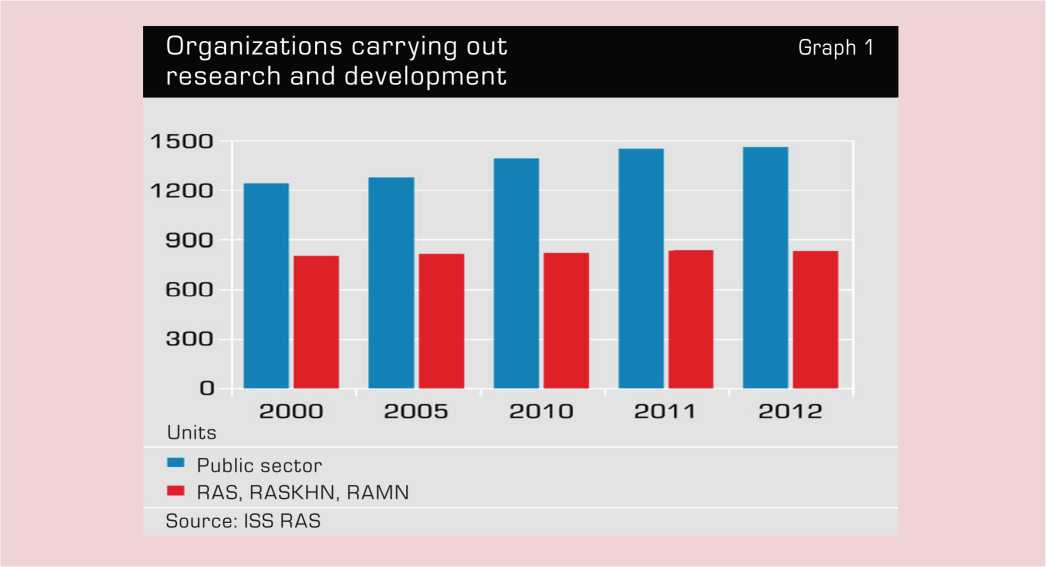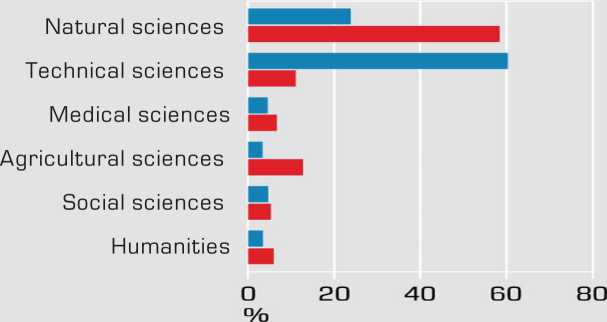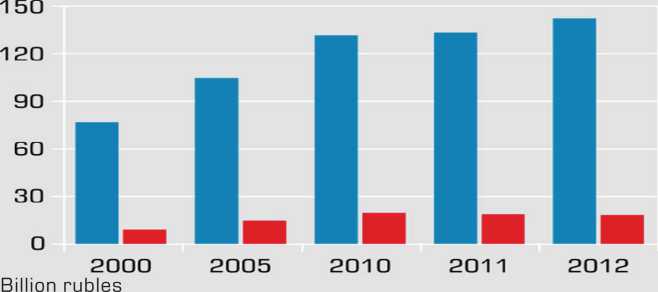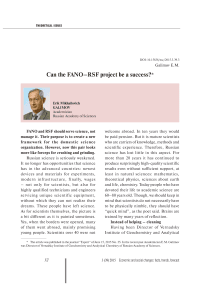Can the FANO-RSF project be a success?
Автор: Galimov Erik Mikhailovich
Журнал: Economic and Social Changes: Facts, Trends, Forecast @volnc-esc-en
Рубрика: Theoretical issues
Статья в выпуске: 3 (39) т.8, 2015 года.
Бесплатный доступ
Короткий адрес: https://sciup.org/147223733
IDR: 147223733 | DOI: 10.15838/esc/2015.3.39.3
Текст статьи Can the FANO-RSF project be a success?
Academician
Russian Academy of Sciences
FANO and RSF should serve science, not manage it. Their purpose is to create a new framework for the domestic science organization. However, now this pair looks more like forceps for crushing and grinding.
Russian science is seriously weakened. It no longer has opportunities that science has in the advanced countries: newest devices and materials for experiments, modern infrastructure, finally, wages – not only for scientists, but also for highly qualified technicians and engineers servicing unique scientific equipment, without which they can not realize their dreams. These people have left science. As for scientists themselves, the picture is a bit different as it is painted sometimes. Yes, when the borders were opened, many of them went abroad, mainly promising young people. Scientists over 40 were not welcome abroad. In ten years they would be paid pension. But it is mature scientists who are carriers of knowledge, methods and scientific experience. Therefore, Russian science has lost little in this aspect. For more than 20 years it has continued to produce surprisingly high-quality scientific results even without sufficient support, at least in natural sciences: mathematics, theoretical physics, sciences about earth and life, chemistry. Today people who have devoted their life to academic science are 60–80 years old. Though, we should keep in mind that scientists do not necessarily have to be physically nimble, they should have “quick mind”, as the poet said. Brains are trained by many years of reflection.
Instead of helping – cleaning
Having been Director of Vernadsky Institute of Geochemistry and Analytical
Chemistry of Russian Academу of Sciences (GEOKhI RAN), I watched the processes unfolding in the field of science in the country. The Institute is engaged in global geochemistry and forecasting mineral raw materials, space research, research in the ocean (it has a oceanographic ship), biogeochemistry and ecology, the problem of radioactive waste disposal, development of analytical chemistry. This is a typical large institute of the Russian Academy of Sciences, one of the best. So, as the saying goes, what is good or bad for this institution, good or bad for science.
The first stage of work in the system of the Federal Agency for Scientific Organizations (FANO) was completely disappointing. The expectation that FANO would undertake the issues of economic management was of no effect. The President urged FANO to take upon property matters and let researchers focus on science. Scientists are still concerned about renting out premises to carve out money for current repairs, maintenance of security, communication, maintenance of the heat supply and sewerage systems, etc. FANO clearly considered its task to carry out only administrative measures and instill “order” in science.
Do we need this work of FANO? Probably, yes. As FANO reported at the meeting of the President’s Council of Advisors on Science and Technology, the inspection had revealed dozens of small pseudo-scientific organizations, which attracted budgetary funds. The parasitic structures, identified by FANO, were formed, because the scientific community had been imposed to stick to bureaucratic building of science. Paper reports were multiplied and money went into the sand.
It would seem that the government could rely on the Russian Academy of Sciences in the struggle for the quality and effectiveness of science. However, the authorities opposed it to FANO. And the Agency launched a “purge” in institutes –flagships of science, focusing on formal indicators (age, number of publications, etc.). The established commissions searched for violations, often ludicrous nature, and left vital issues unresolved.
The state of the research fleet of the Russian Academy of Sciences is still an unresolved problem. In the Soviet times the huge, highly equipped fleet was managed by the state. The academic institutions carried out only expeditions and operational management of vessels that were assigned to them. With the beginning of “perestroika” the vessels were left in the hands of institutions virtually without any support. To maintain and repair the fleet more than 100 million rubles a year was allocated from the budget, while the normal operation of the fleet of this size and quality demanded at least 2 billion rubles a year. The scientific fleet is a valuable tool for studying planetary geological processes, in particular processes in the ocean that affect environment, climate, biological productivity, causing catastrophic events. Therefore, scientists sought to keep the scientific fleet afloat. Without any help and support people kept public property, relying solely on the old Soviet concern for the public good. They organized international expeditions when foreign partners were ready to pay for them. They freighted ships. The vessels even carried cargo and tourists. They hoped for the time when the scientific fleet would be fully used for its intended purpose. It would seem that the time had come. All the property, institutions and the fleet were transferred to FANO. However, as in other cases, the Agency took the position of a supervisory organization, refusing to bear any responsibility.
My personal conflict with the leadership of FANO was connected with the problem to repair and maintain the vessel belonging to the Institute. Today when this conflict is already resolved, it makes no sense to go into the details. It is only important to note that there is an important result of past discussions: FANO should take real action to save the fleet, in particular the vessel belonging to GEOKhI RAN. It is really happening now. It is a shift in the right direction, which has showed that if FANO considers its main goal to support research institutions in the organization of their activities, respect the work of scientists (the Agency staff clearly lacks it), this new form of science organization can play a positive role in our country.
To find common ground
To make the reform of science successful it is extremely important to find the correct platform of interaction between FANO and RAS. There are declarations on joint action, expert functions of the RAS and coordination of personnel decisions. But the institutions are almost completely cut off from any influence from the Russian Academy of Sciences. If someone thinks that it is the way to improve science, they are mistaken. In today’s circumstances the creation of institutions of dual subordination would be the best solution . Moreover, from the beginning the principle of “two keys”

was the basis for the reform, as announced by its initiators. In this case directors of the institutions, responsible for the property component, would be appointed by FANO and their supervisors would make up the staff of the RAS. They should be selected in teams of institutes, then in departments of the Russian Academy of Sciences (according to the same procedure as before), approved by the RAS Presidium and accountable to it. The same applies to the status of the Academy advisers. This would make it possible for FANO to carry out property and personnel policies and for the RAS – scientific-methodological guidance.
On funding of science
Russian science has another source of funds – Russian Scientific Fund (RSF), whose main task is to distribute grants. That would seem good. The system of research grants is widely used all over the world. It is aimed at supporting the initiatives to minimize the time between the emergence of promising ideas and their inclusion in the base funding. However, the RSF, actually in conjunction with FANO, has another purpose: distribution of funding among those who will remain after FANO “cleaning”.
However, scientific talent and talent to fill in an application are often two different things. The expert committees, even if they are composed of objective and competent scientists can not make a correct judgment, as the applications represent just fragments of a holistic scientific work. Only research teams know who is who, who generates ideas, who is a great experimenter, though he/she do not often publish hi/her works and is lazy to defend a thesis. Only basic funding – the funds allocated to the institutions for their teams and academic boards to manage them – can be used as efficiently as possible.
Distribution of researchers Graph 2
by field of science in 201 2

■ Total ■ RAS, RASKHN, RAMN Source: ISS RAS
Do we need grants? Is this form to support science useful? Yes, but only as an addition to the base funding. For specialized institutions, such as institutes of the Academy of Sciences, this form of financing can be just devastating. As in the case of FANO, the uneven and ill-considered use of forms and methods to distribute grants from the RSF lead to the transfer of good intentions into a bad practice.
This also applies to the problem of technical equipment, which is of great importance in modern science. It is expensive and devices for finest tests and a number of support equipment and materials. It would seem that the most economical and efficient way of their use is not to distribute devices of all institutions, but to create centers for collective use. Centers for collective use are useful. However, they can only be of secondary importance, just to obtain routine data, like rent a car. Rented cars are also useful. But private cars give more opportunities. Every car owner will tell you this. People without their own cars find it appropriate to rent a car when necessary. Unique devices should be in possession of specialized research laboratories, which do not only use them, but also create new methods on their basis. But, of course, the use of unique devices, installed in special laboratories, should bee carried out within the framework of scientific cooperation, as all over the world.
Science and society
Science can not be considered outside the society. Without adjusting some basic things, it will be impossible to properly reform science.
Cash against goods . The question is why state corporations managers sometimes get tens of millions rubles a month. President Vladimir Putin says that such a salary is paid to their foreign colleagues. We ca not pay less to people occupying a similar position. It is convincing. But this argument should be extended to other cases. The salary of a professor at an institute is less than 50 thousand rubles a month and the salary of a professor of the same qualification level, for example, in Canada amounts to 300–400 thousand rubles a month in our currency.
But the main thing for any scientist is not payment, but the opportunities provided to conduct research. They are determined by the funds allocated to equipment, experiments and expeditions. Everyone understands that it is impossible to have competitive science in the country where the funding of science per scientist is lower by 5–7 times than in the countries with advanced scientific and technological culture. Of course, it is understood by the government as well. It does not want to “waste” money on funding the entire scientific community as widespread now, but provide targeted support to the most productive working departments and, consequently, increase wages of effectively working scientists and reduce the total number of scientists. This is the FANO–RSF project. In other words, it is the principle “cash against goods”. But in science there is a different principle “pay up first”. We can do nothing about it. It is necessary to look for a nonlinear compromise. The institutions that will be able to reduce the number by 20%, should receive two-fold increased funding. In the next five years, the institutions that will reduce the number by 20% one more time, should again receive two-fold increased funding. Then the funding for institutions that have achieved outstanding results should be also increased. So, in ten years it will be possible to reach the normal level of the state of science.
What to expect from business . Applied science should get money from business. The state should create the conditions for business to receive profit from it. However, until science can provide businesses with the 10–15% increase in profit, while the 50% increase is agreed with officials, business is unlikely to show interest in science. After all, to invest in science means to risk money. But the wider and more powerful the basis of science, the greater practical benefit from it. This basis is created by fundamental science. Fundamental science, sometimes abruptly changing the direction of production, is rather in contradiction with the current needs of business. The state needs fundamental science not to solve its current problems, but provide the development foundation and secure the future.
Trust and science. Trust should be the guiding principle of the state–science relations. Distrust causes the need to keep everything under control. People line up bureaucratic barriers with the good intention to prevent abuse. As a result, honest people lose a lot of time and effort to prove their honesty: inquiries, reports, justifications, etc. Meanwhile, crooks, who feel at ease in the bureaucratic world, can overcome all barriers easily. Total control requires the maintenance of a huge bureaucratic and law enforcement apparatus. Only at first glance it seems that it is wiser to prevent a crime than to look for the culprit. In most cases it is more advantageous to trust people, and when a violation occurs, to find and punish the guilty. One has to control everybody, but to look for the few.
In particular, it is necessary to let the institutions determine the direction of spending funds allotted by the state. Until recently everything was written down by articles. Budget organizations live a poor, but irresponsible life. If there is a fire – we are not to blame. We asked for the money on fire-fighting equipment, but did not get any. When the teams can distribute money on their own, they will have to think how to work optimally and how increase wages. To buy expensive equipment, they will have to reduce the staff number. But it will be their own decision, not imposed from higher authorities, which causes distrust and resistance. Therefore, the reforms do not succeed, as they are imposed top-down and not the result of rational choices of the research team . It is necessary to cancel the law on tenders, a striking manifestation of the distrust principle. It is very important to be able to transfer unspent funds to the next fiscal year. Then it is possible to save money on an expensive appliance for some years. Up to date the means have been written off at the year end, as it is convenient from bureaucratic considerations. Funding is often received in the last months of the year. So, not to lose money, they are spent for completely unnecessary or secondary purposes.
Domestic expenditures on research Graphs and development at 2000 values

■ Total
■ RAS, RASKHN, RAMN
Source: ISS RAS
In Russia people always respect learning, education. Belonging to the respected part of society has attracted the gifted to science. Now this incentive has virtually disappeared. To restore it in our society is a task no less important than funding. I hope that FANO considers the problems in this direction.
The scientific community has a suspicion that the FANO–RSF project focuses only on the seizure of property and the elimination of existing forms of domestic science, especially academic. I believe that the FANO–RSF project has good, but unobtainable goals. The authorities obviously have the wrong impression about organic helplessness of Russian science and the need for its adjustment to Western standards. Many methods and ideas that work in the West are not applicable in Russia. These ideas are not bad, but Russia traditionally has other social priorities. Officials urge scientists to take the initiative in reforming, but they are deaf to the suggestions that do not fit into their view, and those proposals that are suitable for them are often unproductive. If you stand your ground stubbornly, waiting for collapse of the opponent, this could lead to the total collapse. The experience of discussions shows that the constructive approach and the readiness to come to common ground can make the reform successful.
Список литературы Can the FANO-RSF project be a success?
- Galimov E.M. Can the FANO-RSF project be a success? “Expert” of June 15, 2015 No. 25


